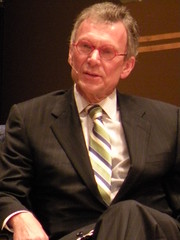First things first
Foremost (h/t The Plank): The question to guide your day-to-day life in this new era.
Rush Limbaugh, conservative giant
Also via The Plank: Who is Rush Limbaugh? According to Republican Congressman Phil Gingrey, yesterday, “it’s easy if you’re Sean Hannity or Rush Limbaugh or even sometimes Newt Gingrich to stand back and throw bricks. You don’t have to try to do what’s best for your people and your party. You know you’re just on these talk shows and you’re living well and plus you stir up a bit of controversy and gin the base and that sort of that thing.”
But he had that all wrong, he realised today, after some constituents helpfully called in to remind him. In reality, he corrected himself in a statement titled “Gingrey comments on Rush misunderstanding,” Rush Limbaugh is not just a “voice [..] of the conservative movement’s conscience”, but … a “conservative giant”.
Who are the hottest professors?
In love with your prof? If so, he/she is likely to lecture languages. There is “Real Social Scientific Data” (mind your footnotes) on the relative hotness of the different disciplines, which comes via Prof. Henry Farrell (Political Science, ranked fifth) at the Monkey Cage.
Law and criminal justice take a prominent second and fourth place (out of 36) in the ranking, which might please fellow blogger Joefromchicago. Unsurprisingly, engineering, computer science and chemistry rank at the bottom, so pity the poor professors in those duller disciplines — after all, tenure without temptation is like aspersions without alliteration.
Economists, however (ranked 30th) have reason to harbour hope, judging on Shivaji’s observation that they’re up next to be fetishized by pop culture:
After the phenomenal success of books such as Freakonomics, Undercover Economist, Armchair Economist [..], every economist is under pressure to come up with some innovative approach to explain mundane things in life. Forget earlier topics like “Why aid doesn’t work in Africa” or “Implications of direct cash grants on Philips curve” that used to keep economists intrigued; the best talent in business are now looking for more relevant topics. And even though some of the most pressing issues facing mankind such as “Overpricing of the hotel mini-bar” (Tim Harford) and “socioeconomic patterns of naming children” (Steven Levitt) have already been worked upon, there still remain some fundamental questions that remain unanswered. For example, “How many love songs are written for every break-up song and why” or “why do men wash underwear less frequently than women”, or “Why does Ronald McDonald not get fat”?
Where are Americans moving to? And from?
 Talking about comparative hotness – which states of the US are hemorrhaging homes, and which ones are rapidly reeling in the residents? Earlier this month, Patrick Ottenhoff dug into the demographics on domestic migration between 2000 and 2008, and put up a map on The Electoral Map. It’s not as simple as cities versus flyover country, he emphasises: loser states cover a contiguous chunk of territory from Massachusetts to Nebraska, while most of the states strongly gaining ground are clustered together in the West and on the Atlantic seaboard from Virginia to Florida.
Talking about comparative hotness – which states of the US are hemorrhaging homes, and which ones are rapidly reeling in the residents? Earlier this month, Patrick Ottenhoff dug into the demographics on domestic migration between 2000 and 2008, and put up a map on The Electoral Map. It’s not as simple as cities versus flyover country, he emphasises: loser states cover a contiguous chunk of territory from Massachusetts to Nebraska, while most of the states strongly gaining ground are clustered together in the West and on the Atlantic seaboard from Virginia to Florida.
What’s the real reason Putin handpicked Medvedev for President?
 Of course, or so the cheekier of conventional wisdoms go: term-limited out of the Presidential office, Putin needed someone to keep his seat warm while he played Prime Minister for a few years, so he could return to the Presidency soon enough. But why Medvedev?
Of course, or so the cheekier of conventional wisdoms go: term-limited out of the Presidential office, Putin needed someone to keep his seat warm while he played Prime Minister for a few years, so he could return to the Presidency soon enough. But why Medvedev?
Why, his luxurious head of hair of course. It’s the only way the steely-eyed leader could deal with the longstanding law of succession when it comes to ruling Russia. Lenin – bald; Stalin – hairy; Khrushchev – bald; Brezhnev – hairy; well, you get the idea. Gorbachev was bald, Yeltsin hairy, and well – let’s be honest, Putin isn’t particularly blessed in this regard.
By choosing Dmitry last year, Putin bent the Bald-Hairy Theory of Russian Leaders to his will to power – and the two can rule till death do them part.



 As you’ll have guessed, that was the Minnesota race between Al Franken and Norm Coleman. The two men raised $20.5 million and $18.0 million, respectively. That translates to $488 thousand and $430 thousand for each percentage point of the vote they ended up winning – which ranks Al and Norm as #1 and 2 when it comes to raising the most money per percentage point won.
As you’ll have guessed, that was the Minnesota race between Al Franken and Norm Coleman. The two men raised $20.5 million and $18.0 million, respectively. That translates to $488 thousand and $430 thousand for each percentage point of the vote they ended up winning – which ranks Al and Norm as #1 and 2 when it comes to raising the most money per percentage point won. Your vote was worth most up in Alaska. Mark Begich raised a total of $4.4 million – which translates to a royal $29 for every single vote he received. His opponent, Ted “bring home the pork” Stevens, was right up there too and raised a stunning $26 per vote – in vain.
Your vote was worth most up in Alaska. Mark Begich raised a total of $4.4 million – which translates to a royal $29 for every single vote he received. His opponent, Ted “bring home the pork” Stevens, was right up there too and raised a stunning $26 per vote – in vain.
 Then there’s the question of strategy. I already linked to Josh Marshall’s
Then there’s the question of strategy. I already linked to Josh Marshall’s 



